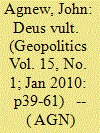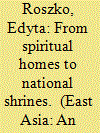| Srl | Item |
| 1 |
ID:
095988


|
|
|
|
|
| Publication |
2010.
|
| Summary/Abstract |
The Catholic Church is a religious tradition with a highly centralised organisational structure which operates worldwide but that must adjust itself to and effectively operate in local and world-regional contexts that can often challenge and threaten to subvert its central doctrines, operational principles, and political compromises with secular authorities. The Church has long provided the source and model, with its base in the sacred origins of sovereignty, for a quintessentially Western statehood. In this context, I wish to raise three points for further discussion using the significant example of the Catholic Church that future research on the contemporary confluence between religion and geopolitics should address. The first is whether a church can have "geopolitics." I answer in the affirmative with a number of arguments for doing so. The second is the idea, made in writing and in his practice by Pope Benedict, that Western civilisation is in crisis and that only a restoration of a historic Christendom (Europe) based on a reinvigorated Catholic Church can save it. I dispute the strategy of "hard" or coercive power and the focus on Europe he has apparently chosen as departing from what has often best served the Church in the past. Third, and finally, in the global struggle for souls, numbers matter. Somewhat akin to the struggle for primacy between states in the modern geopolitical imagination, the struggle for souls between faiths (Catholics and Protestants, Moslems and Christians, etc.) is once more in ascendance. But doesn't this quantitative emphasis risk subverting the Church's post-Vatican II emphasis on Christian practice in everyday life? The overall purpose of the article is to introduce religious organisation and associated theological claims into the problematic of geopolitics using the case of the world's largest Christian denomination.
|
|
|
|
|
|
|
|
|
|
|
|
|
|
|
|
| 2 |
ID:
114666


|
|
|
|
|
| Publication |
2012.
|
| Summary/Abstract |
As in China and Soviet Russia, religion in Vietnam was considered to be
harmful superstition. However, a glimpse into the Governmental Gazette - Công
Báo - displays the important transformation of the state's policy toward religion that
became translated into national representation. While this article focuses on nationbuilding as a dynamic cultural process that leads to the promotion of selected
religious practices as 'national heritage,' it also explores the state-society
relationship beyond binaries. By looking at religious spaces and local communities
I argue that in Vietnam religion is a powerful form of nation-building process and
constitutes a creative space in which different actors exercise their agency beyond
resistance and accommodation.
|
|
|
|
|
|
|
|
|
|
|
|
|
|
|
|
| 3 |
ID:
133298


|
|
|
|
|
| Publication |
2014.
|
| Summary/Abstract |
In this paper we focus on the Republican Mosque in Derinkuyu, Turkey, a Greek Orthodox church built in 1859 and transformed into a mosque in 1949 that still exhibits many obviously Christian structural features not found in most such converted churches. We utilize the concept of religioscape, defined as the distribution in spaces through time of the physical manifestations of specific religious traditions and of the populations that build them, to analyze the historical transformations of the building, and show that this incongruity marks a specific stage in the long-term competitive sharing of space by the two religiously defined communities concerned. This shared but contested space is larger than that of the building or even the town of Derinkuyu. We argue that syncretism without sharing correlates with a lack of need to show dominance symbolically, since the community that had lost the sacred building had been displaced as a group, and was no longer present to be impressed or intimidated.
|
|
|
|
|
|
|
|
|
|
|
|
|
|
|
|